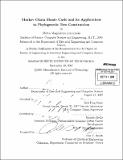Markov chain Monte Carlo and its applications to phylogenetic tree construction
Author(s)
Luczynska, Marta Magdalena
DownloadFull printable version (5.240Mb)
Other Contributors
Massachusetts Institute of Technology. Dept. of Electrical Engineering and Computer Science.
Advisor
Kph-Ping Dunn and Manolis Kellis.
Terms of use
Metadata
Show full item recordAbstract
This thesis addresses the application of Bayesian methods to problems in phylogenetics. Specifically, we focus on using genetic data to estimate phylogenetic trees representing the evolutionary history of genes and species. Knowledge of this common ancestry has implications for the identification of functions and properties of genes, the effect of mutations and their roles in particular diseases, and other diverse aspects of the biology of cells. Improved algorithms for phylogenetic inference should increase our potential for understanding biological organisms while remaining computationally efficient. To this end, we formulate a novel Bayesian model for phylogenetic tree construction based on recent studies that incorporates known information about the evolutionary history of the species, referred to as the species phylogeny, in a statistically rigorous way. In addition, we develop an inference algorithm for this model based on a Markov chain Monte Carlo method in order to overcome the computational complexity inherent in the problem. Initial results show potential advantages over methods for phylogenetic tree estimation that do not make use of the species phylogeny.
Description
Thesis (M. Eng.)--Massachusetts Institute of Technology, Dept. of Electrical Engineering and Computer Science, 2007. Cataloged from PDF version of thesis. Includes bibliographical references (p. 93-96).
Date issued
2007Department
Massachusetts Institute of Technology. Department of Electrical Engineering and Computer SciencePublisher
Massachusetts Institute of Technology
Keywords
Electrical Engineering and Computer Science.